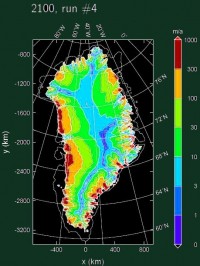By Cardinal George Pell, Archbishop of Sydney
The tide on climate change is starting to turn. The Australian government is becoming more cautious.

It is rare to read a new book likely to make a huge difference to public opinion. Professor Ian Plimer’s 500 page book with 2300 footnotes “Heaven and Earth. Global Warming: The Missing Science” is such a book. 30,000 copies were sold in its first month.
Plimer is not a climate change denier, because history shows the planet is dynamic and the climate is always changing, sometimes drastically.
Ice Ages have come and gone and we don’t know why. History has seen glaciers at the equator and at one time Scandinavia was under 5 kilometres of ice. Sea levels have been 130 metres lower than today. Some consolation comes from the fact that ice sheets predominated for only 20 per cent of the earth’s history.
Plimer demonstrates that a considerable amount of scientific evidence has been produced to counter the still predominant view that human activity, especially through industry, has polluted the atmosphere with carbon dioxide, which will produce disastrous climate changes including a rise in temperature, a melting of the ice caps and rising sea levels.
Contrary evidence is already changing the debate. Australia, with its tiny economy, is no longer aiming to lead the world. The threat of massive job losses and increasing awareness of new evidence will provoke even greater caution in the future.
Originally we were warned about the “greenhouse effect”; then it was “global warming”, followed in turn by “climate change”. Now we talk about reducing the “carbon footprint”. The light is dawning and 30 per cent of scientists are sceptics or deniers.
Non-scientists should not blindly follow expert opinion and this includes Plimer. To the extent we can, we should examine their evidence. While it is still early days in the debate, Plimer’s critics have been heavy with the abuse and short on counter evidence.
We should also look back at history for more accurate information and ignore computer models of the long-term future. Climate models making claims for decades into the future cannot work, because we do not know enough about many factors which influence weather, such as the level of activity of the sun, the earth’s orbit and wobbles, the level of cloud cover, volcanoes.
One basic claim of Plimer is that an increase of carbon dioxide does not cause temperature rises, but might follow such rises.
What do we make of these facts? The carbon dioxide in the atmosphere continues to rise, but the world’s temperature has not risen since 1998.
In Roman times and in the Medieval Warming (900 - 1300 A.D.) temperatures were higher than today by five and six degrees Celsius. No industries then!
In different Ice Ages the earth’s atmosphere contained five and ten times the amount of carbon dioxide today.
Evidence shows the wheels are falling from the climate catastrophe bandwagon. Read more here.
A statement by Viv Forbes, Chairman of the Carbon Sense Coalition
Australian farmers pay livestock levies, research levies, marketing levies and taxes on every product they sell. These support an army of officials supposedly representing their interests - the Meat and Livestock Corporation, the Wool Corporation, CSIRO and the numerous state and federal agriculture departments and politicians. But not one of these has defended the industry from the obviously fraudulent claim that animal emissions play a significant part in causing global warming.
It does not take even high school science to understand that all animals are part of the natural carbon cycle that uses plants to take carbon dioxide from the atmosphere, and then uses solar energy to convert this to plant sugars and proteins. The carbon is then taken up by animals that live on plants, and finally returned to the atmosphere as carbon dioxide and methane as these animals exhale, excrete or expire. Carbon dioxide is a harmless natural plant food. Methane is another harmless natural gas which is oxidised in the atmosphere to carbon dioxide and water. Then whole cycle starts again with no net addition to so-called greenhouse gases.

The phrase “ashes to ashes and dust to dust” expresses more understanding of the carbon cycle than all the failed computerised climate models that rate animal emissions as significant factors in climate change. Animals and plants have always been cycling carbon dioxide and methane with no long term or permanent effect on climate. The wild herds of mammoths, aurochs, reindeer, wildebeest, zebra, bison, antelope, wild sheep, warthogs, horses, camels, rabbits and kangaroos have just been partially replaced by domesticated cattle, sheep, goats, buffalo and pigs. All are part of the natural world and none of them have any long term effect on the amount of carbon dioxide in the atmosphere.
To threaten a carbon tax on animal emissions without recognising an equal credit for the carbon dioxide extracted by them from the atmosphere is shoddy science and shoddy accounting. Surely for all the taxes and levies they pay, farmers can get at least one government scientist, official or carbon accountant willing to state the obvious:
“Cattle and sheep are as green as grass and trees and should not be penalised by any future carbon tax on their emissions”. Governments should state this clearly now and stop including animal emissions in their spurious carbon accounting.
Read more detailed analysis here.
Editorial in the Washington Times
A person needn’t be a buffoon or political hack to be skeptical of global warming. That would be news to The Washington Post’s news desk, however.
A Post article on May 19 falsely reported that there is a “consensus” among scientists and a growing portion of the American public that human carbon emissions are causing a dangerous, long-term increase in worldwide temperatures. The facts, overwhelmingly, show no such consensus.
The Post’s David A. Fahrenthold reported that Republican “warming skeptics” are becoming ever bolder on Capitol Hill even as “most” or a “consensus” of “scientists around the globe have rejected their main arguments - that the climate isn’t clearly warming, that humans aren’t responsible for it, or that the whole thing doesn’t amount to a problem.” He continued: “Public opinion has also shifted” in favor of warming’s existence and importance.
The latter claim is risible. Earlier this month, Gallup poll editor Frank Newport told U.S. News & World Report’s Paul Bedard that on global warming, “Any measure that we look at shows Al Gore’s losing at the moment. The public is just not that concerned.” The highest number of respondents ever, he said - 41 percent - thinks warming claims are exaggerated. That 41 percent swamped the 28 percent who think the threat is “underestimated.” Of eight major “environmental issues” (including water pollution and loss of rain forests), the public ranked warming last. The Pew Research Center in January reported climate change ranking dead last among 20 major public concerns.
Respected scientists are far from united on the issue. Reports in August from the International Geology Congress - and from other conferences or major scientific organizations in Canada, Japan, Australia and elsewhere - indicate majorities disagreeing with climate-change dogma. Republicans on the Senate Committee on Environment and Public Works have compiled a list of more than 700 well-credentialed scientists, including many who once believed in warming, who argue against the warming theory.
More than 31,000 scientists have signed a Global Warming Petition expressing doubts. The founder of the Weather Channel, John Coleman, has written that warming is “the greatest scam in history.” As far back as two years ago, The Post’s own Juliet Eilperin reported that consensus on warming was shrinking, not growing. And for good reason. Earth temperatures actually have dropped since 1998. The National Snow and Ice Data Center in April showed more Arctic sea ice than in any April since 2003. Even many prominent warming supporters acknowledge that their own models now forecast cooling for the next 30 years.
Whichever group of scientists is correct, the simple fact is that the idea of consensus is a myth.
The Post reported none of this. The only examples of warming skeptics The Post cited were those of foot-in-mouth Republican politicians. The story features a huge highlighted quote from House Minority Leader John A. Boehner of Ohio, who misspoke in an April ABC interview to the effect that the issue was whether carbon dioxide is a carcinogen. A Boehner spokesman says the leader meant to question whether it is a pollutant, which is a perfectly reasonable issue.
The Post’s Mr. Fahrenthold did not ask Mr. Boehner’s office if the congressman still thinks the issue involves carcinogens. Yet the story was published as if Mr. Boehner’s comment, ludicrous on its face, represents his continuing understanding rather than a simple verbal error of the sort frequently made in live interviews.
The Post portrayed all skeptics as “irrelevant” ignoramuses asking “head-scratching” questions in an “odd way” that is not “germane,” but it refused to provide a single sentence acknowledging the growing debate among widely admired scientists. The misreporting in favor of a far-from-proven theory is enough to make any fair-minded person extremely hot - under the collar. See the editorial here.
By Roger Harriban, BBC News
US Energy Secretary Steven Chu says the US will not be able to cut greenhouse emissions as much as it should due to domestic political opposition. Prof Chu told BBC News he feared the world might be heading towards a tipping point on climate change. This meant the US had to cut emissions urgently - even if compromises were needed to get new laws approved. Environmentalists said Prof Chu, a Nobel physicist, should be guided by science not politics. The American political system is in the throes of a fierce battle over climate policy. President Barack Obama says he wants cuts in greenhouse gases but has left it to Congress to make the political running.
The House of Representatives is debating a climate and energy bill but even if it passes it may be rejected by senators, many of whom are funded by the energy industry. Prof Chu is a Nobel prize-winning physicist and a world expert on clean energy. But he said it was impossible to ignore political reality. “With each successive year the news on climate change has not been good and there’s a growing sensation that the world and the US in particular has to get moving,” he said.

“As someone very concerned about climate I want to be as aggressive as possible but I also want to get started. And if we say we want something much more aggressive on the early timescales that would draw considerable opposition and that would delay the process for several years. The US energy secretary said that awareness of climate tipping points had increased greatly only in the past five years. He added: “But if I am going to say we need to do much, much better I am afraid the US won’t get started.”
To the anger of environmentalists, he said that one compromise would be approving new coal-fired power plants without obliging them to capture and store their carbon. The UK government has made this a stipulation for new coal plants but Prof Chu declined to explain why the US government would not follow suit. Read more here.
Icecap Note: We can only hope it is because he has seen what a disaster the UK has become based on the unwise political solutions that environmentalists and tools like you in the media have lobbied for.
Meanwhile, in posturing for the upcoming Copehagen UN climate conference, Dow Jones reported “Developed nations must cut their greenhouse gas emissions by at least 40% by 2020 from 1990 levels, China said Thursday in a document putting forward its demands for December climate talks in Copenhagen. Such nations should also provide funding of at least 0.5%-1% of their annual gross domestic product to help poorer countries cope with climate change and greenhouse gas emissions, it said in the document, which was posted on the National Development and Reform Commission’s Web site. A new climate change pact is expected to be sealed at the Copenhagen conference that will succeed the current Kyoto Protocol.”
By Bjorn Lomborg, Wall Street Journal
Some business leaders are cozying up with politicians and scientists to demand swift, drastic action on global warming. This is a new twist on a very old practice: companies using public policy to line their own pockets.
The tight relationship between the groups echoes the relationship among weapons makers, researchers and the U.S. military during the Cold War. President Dwight Eisenhower famously warned about the might of the “military-industrial complex,” cautioning that “the potential for the disastrous rise of misplaced power exists and will persist.” He worried that “there is a recurring temptation to feel that some spectacular and costly action could become the miraculous solution to all current difficulties.”
This is certainly true of climate change. We are told that very expensive carbon regulations are the only way to respond to global warming, despite ample evidence that this approach does not pass a basic cost-benefit test. We must ask whether a “climate-industrial complex” is emerging, pressing taxpayers to fork over money to please those who stand to gain.
This phenomenon will be on display at the World Business Summit on Climate Change in Copenhagen this weekend. The organizers—the Copenhagen Climate Council—hope to push political leaders into more drastic promises when they negotiate the Kyoto Protocol’s replacement in December. The opening keynote address is to be delivered by Al Gore, who actually represents all three groups: He is a politician, a campaigner and the chair of a green private-equity firm invested in products that a climate-scared world would buy. Naturally, many CEOs are genuinely concerned about global warming. But many of the most vocal stand to profit from carbon regulations. The term used by economists for their behavior is “rent-seeking.”
The world’s largest wind-turbine manufacturer, Copenhagen Climate Council member Vestas, urges governments to invest heavily in the wind market. It sponsors CNN’s “Climate in Peril” segment, increasing support for policies that would increase Vestas’s earnings. A fellow council member, Mr. Gore’s green investment firm Generation Investment Management, warns of a significant risk to the U.S. economy unless a price is quickly placed on carbon.
The World Business Summit will hear from “science and public policy leaders” seemingly selected for their scary views of global warming. They include James Lovelock, who believes that much of Europe will be Saharan and London will be underwater within 30 years; Sir Crispin Tickell, who believes that the United Kingdom’s population needs to be cut by two-thirds so the country can cope with global warming; and Timothy Flannery, who warns of sea level rises as high as “an eight-story building.”
Free speech is important. But these visions of catastrophe are a long way outside of mainstream scientific opinion, and they go much further than the careful findings of the United Nations panel of climate change scientists. When it comes to sea-level rise, for example, the United Nations expects a rise of between seven and 23 inches by 2100—considerably less than a one-story building.
There would be an outcry—and rightfully so—if big oil organized a climate change conference and invited only climate-change deniers.
The partnership among self-interested businesses, grandstanding politicians and alarmist campaigners truly is an unholy alliance. The climate-industrial complex does not promote discussion on how to overcome this challenge in a way that will be best for everybody. We should not be surprised or impressed that those who stand to make a profit are among the loudest calling for politicians to act. Spending a fortune on global carbon regulations will benefit a few, but dearly cost everybody else. Read much more here.
By Lord Christopher Monckton on SPPI
UPDATE: SPPI has packaged some essential readings on “The Futility and Danger of CO2 Mitigation Schemes, Policy, Science and Politics here.
Two new papers have been published at SPPI bearing on the current mark up of cap and trade legislation in the US Congress.

Why Waxman/Markey Won’t Work: A cost-effectiveness metric for CO2 mitigation policies
“A simple, robust metric to analyze the cost-effectiveness of measures to mitigate anthropogenic CO2 emissions, expressed not - as now - in tonnes of CO2 emission foregone but in Kelvin degrees of warming prevented, is described, evaluated, and applied to various currently-proposed mitigation policies, all of which prove disproportionately costly and ineffective.” A simple, robust metric to analyze the cost-effectiveness of measures to mitigateanthropogenic CO2 emissions, expressed not - as now - in tonnes of CO2 emission foregone but in Kelvin degrees of warming prevented, is described, evaluated, and applied to various currently-proposed mitigation policies, all of which prove disproportionately costly and ineffective. Results: To reduce mean global surface temperature by 1K, CO2 emissions of 2-20 teratonnes must be foregone. Full implementation of the Waxman-Markey Climate Bill of 2009 would reduce mean global surface temperature by 0.00025-0.0025 K/year at a cost of $60-600 trillion for each 1 K reduction in mean global surface temperature, and reducing temperature by 1 K via the Bill would take 400-4000 years.
Shutting down the entire global economy would reduce temperature by 0.0035-0.035 K/year. Implications for global macroeconomic policy are considered. The threatened shutdown of five-sixths of today’s US economy, which would in effect allow electricity and automobile use for just one day per week, would reduce mean global surface temperature by 1K in 400-4000 years. The Obama White House has estimated the cost of implementing the Waxman/Markey Bill at $1.8 trillion over the next decade: i.e. $180 billion/year to reduce global temperature by 0.0025-0.00025 K/year. The cost of reducing mean global surface temperature by 1 K via the Waxman/Markey Bill would accordingly be $60-600 trillion. Read the detailed analysis here and Monckton’s plea for congress to read the bill’s hundreds of pages of new provisions carefully and consider seriously the consequences before committing to this ill conceived plan that will hurt the American economy and energy future for decades to come.
On the Central Question of Climate Sensitivity Lord Monckton’s response letter to Congressmen Barton and Upton on the central question of climate sensitivity. He starts: “Following my recent testimony before the Energy and Commerce Committee of the House, you kindly directed a question to me via the Committee Clerks- “Is there any dispute that, as you say, “How much warming will a given proportionate increase of CO2 concentration cause?” is the central question of the climate debate?
a) “If so, what is it?
b) “If not, why hasn’t the scientific community participating in the IPCC caught the matter?”
Read Christopher’s detailed reply to the questions from the committee after his testimony here.
By Maria Cheng, AP
Since climate change fears first gripped the globe, tourists have flocked to the Maldives to enjoy the islands’ spectacular vistas before they vanish.
Do they really need to rush?
Scientists have long warned that the Maldives, an archipelago nation of nearly 1,200 islands in the Indian Ocean, will be wiped out by rising sea levels in the coming decades. President Mohamed Nasheed is so convinced of his nation’s demise he has proposed relocating all 350,000 inhabitants to other countries. On average, the islands are 7 feet (2.1 meters) above sea level, making them the lowest-lying nation on Earth.

Most experts agree the Maldives have plenty to worry about: In the worst-case scenario, if global sea levels rise higher and faster than expected, the islands may indeed be swallowed up.
But some recent data challenge the widespread belief that the islands are destined to disappear and a few mainstream scientists are even cautiously optimistic about their chances for surviving relatively intact beyond the next century. “The outlook for the Maldives is not all doom and gloom,” said Paul Kench of the University of Auckland in New Zealand. “The islands won’t be the same, but they will still be there.”
Kench said his studies of the Maldives show the islands can adjust their shape in response to environmental changes, such as the rising seas and warmer temperatures predicted in the next century. Kench suggests the islands might move onto their reefs and build vertically, offsetting the potential threat of sea level rises. His research, published together with other scientists from Australia, New Zealand and the Maldives _ shows some islands have rebuilt themselves as much as 1.6 feet (49 centimeters) higher. Their studies have been published in recent years in journals including Geology and the Journal of Geophysical Research.
“It’s quite convincing work and seems to be quite widely accepted by the scientific community,” said Andrew Cooper, a professor of coastal studies at the University of Ulster in Northern Ireland. “They have detailed geological evidence that this kind of growth has happened before in the past. I think the question of the Maldives being completely wiped out may be overstated.”
Following the devastating 2004 Asian tsunami, many scientists assumed the Maldives would be damaged. But Kench and his colleagues not only found little evidence of island erosion, but also that the tsunami had washed sediment ashore, making some islands taller than they were before the catastrophe. Kench warned, however, that while only a small number of Maldivian islands may not be able to adapt to rising sea levels, those are unfortunately the ones where many people live: Male, the nation’s capital, and Hulule. Residents of those islands will probably need to relocate to another country or move to other Maldivian islands that won’t disappear so quickly, he said.
Building taller and moving to higher ground are examples of a hot trend in climate change policy: emphasizing adaptation. While much global warming work aims to limit emissions, adaptation advocates argue for the need to combat the inevitable effects of climate change through forward planning and construction. That includes moving people, building sea walls, and new construction techniques.
Sea levels worldwide have been steadily rising, except in a handful of places, including the Maldives. But in the last 50 years, some data from satellite pictures and tide measurements suggest sea levels in the Maldives have dropped by as much as 12 inches (30 centimeters). “That was definitely unexpected,” said Jonathan Overpeck, director of the Institute for the Study of Planet Earth at the University of Arizona. Overpeck said the decline in the Maldives’ sea levels is probably due to local factors like ocean temperatures and currents.
Such data is inconclusive, however and with few available records, the Indian Ocean remains one of the world’s least understood oceans. Read more here.
By Lubos Motl, The Reference Frame
The arXiv blog has brought our attention to a new paper by Ralf Greve and Shin Sugiyama of Sapporo, Japan,
Decay of the Greenland Ice Sheet due to surface-meltwater-induced acceleration of basal sliding (PDF). They study how much Greenland ice will melt until 2100 and even 2350.

The authors decide that the most important feedback mechanism to study is the lubrication of glaciers by the meltwater which accelerates their motion towards the ocean. The picture I added shows the surface velocity (in meters per year) obtained by their best model. You can see that this effect matters primarily near the West Coast.
See also the change of the surface topography between 1990 and 2350.
Even though they assume an unrealistically high warming by 3C per century (and stabilization of CO2 at 1,000 ppm later), their simulation rules out catastrophic hypotheses about the melting ice in Greenland, e.g. those by James Hansen (do you remember scientific reticence where he waved his hands about similar feedbacks and predicted 10-meter rise of sea level per century?). The simulation predicts 18 centimeters of rising sea levels by 2100 from this major source.
See also some reductions in the estimates of the impact of the West Antarctic melting: Washington Post.
Read more here.


